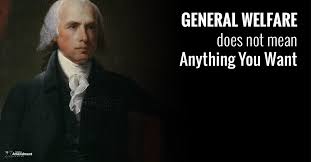Perhaps no more abused clause in all of the Constitution is this one regarding the “general welfare.” It has been the excuse for the national government to get involved in forcing citizens to save for retirement via the social security tax, to health care, to you name it. The clause is repeated in the opening of Article I, Section 8, which is important as I shall point out in Part II on this topic. Interestingly, when the southern states seceded and formed the Confederate States of America, their constitution mirrored the US Constitution in many ways, but glaringly omitted any reference to providing for the “general welfare.”
To ascertain the meaning of this clause I will spend this and the next (or possibly two) essay(s) taking a look at how the founders viewed this clause and how they explained it’s meaning. As I have pointed out in the beginning of this series on the Preamble, merely including this clause in it does not give any authority to Congress to do as they please in matters they determine to be for the “general welfare” as a preamble in not part of the Constitution as far as granting authority, but merely an introduction as to the purpose for those things enumerated within the Constitution.
This general welfare clause and the fear of its potential for abuse was one of the reasons those known as the “Anti-Federalists” opposed the ratification of the Constitution. The first witness I set before you is the author known by the pseudonym “Centinel”, who wrote the following on October 5, 1787:
“The Congress may construe every purpose for which the state legislatures now lay taxes, to be for the general welfare, and thereby seize upon every object of revenue.”
Consider our situation today – how much of our income does Congress “seize upon” in taxes to provide for all of the programs it deems to be for the “general welfare” yet not authorized in the Constitution? Does not Centinel’s warning ring true?
The next witness to warn about this phrase was the outstanding Anti-Federalist known by the pseudonym “Brutus.” He had much to say about the potential for abuse of all three branches of government, and he has pretty much proved to be a prophet with unerring accuracy. Herewith is some of what he had to say about this clause in his essay number VI, written on December 27, 1787:
“It will then be matter of opinion, what tends to the general welfare; and the Congress will be the only judges in the matter. To provide for the general welfare, is an abstract proposition, which mankind differ in the explanation of, as much as they do on any political or moral proposition that can be proposed; the most opposite measures may be pursued by different parties, and both may profess, that they have in view the general welfare; and both sides may be honest in their professions, or both may have sinister views…
It is as absurd to say, that the power of Congress is limited by these general expressions, “to provide for the common safety, and general welfare,” as it would be to say, that it would be limited, had the constitution said they should have power to lay taxes, etc. at will and pleasure. Were this authority given, it might be said, that under it the legislature could not do injustice, or pursue any measures, but such as were calculated to promote the public good, and happiness. For every man, rulers as well as others, are bound by the immutable laws of God and reason, always to will what is right. It is certainly right and fit, that the governors of every people should provide for the common defence and general welfare; every government, therefore, in the world, even the greatest despot, is limited in the exercise of his power. But however just this reasoning may be, it would be found, in practice, a most pitiful restriction. The government would always say, their measures were designed and calculated to promote the public good; and there being no judge between them and the people, the rulers themselves must, and would always, judge for themselves.”
It is very apparent, is it not, that the fears of these two founders regarding the abuse of this clause by those who were to come after them to justify the expansion of the power of government and the diminishment of individual liberties has indeed come to fruition? So, what was the response by those who argued in favor of the adoption of the Constitution? We will examine James Madison’ response in the next essay.
-January 12, 2018
